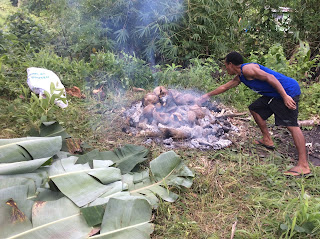We
have had a busy last few weeks and this next week is not any different. We have
a Zone Conference in Tavenui starting Thanksgiving Day. The presiding authority
will be Elder Cardon of the Area Presidency for the South Pacific. We leave on
Thursday and come back the following Tuesday. Sister Roberts will be baking
this week and while we are there to provide meals for the leadership of the
District, the Mission, and President Cardon and, of course, the missionaries.
I hope this blog is easy to read and entertaining.
Makalesi
is the young girl that Jackie is tutoring in English. She is now reading on a 1st
grade level. She is 13 but never did learn to read or write English. She is a
sweet girl and so much fun to listen to as she reads, with her new found
vocabulary. She is using RAZ Kids from Alpine School District.
Sister
Rabuka (pronounced "Rambuka"). She has been a member of the church for 35 years
and lost her husband to a heart attack a few years ago. She is the relief
society president in the branch. She was able to attend the temple last week
for the first time. We were able to teach her with the Temple Prep classes this
past month. When she was there and interviewing with the mission president, she
discussed being sealed to her husband when she goes to America next year.
President Layton told her that would not wait and get her sealed to him after
she received her own endowments. Fortunately, her daughter had done his work so
she was sealed to her husband last Friday. She called us after she got out of
the temple with the good news. She could not hold it in and wanted us to know
of her good fortune at the temple.
This is a “Lovo”. In Hawaii it would be called a Luau. A
fire is started and rocks are placed in the fire. When the rocks are
sufficiently hot, maybe 3-4 hours in the fire, the men move the rocks and
dampen the flames. They then put palm leaves and banana leaves on the hot
stones. Other men are fixing the pig, chicken, lobster, or whatever meat you
might want. They add vegetables and always casaba, a very starchy root crop.
They wrap the meat and vegetables with palm branches with whatever seasoning
they want, usually soy sauce. It is then wrapped with banana leaves and
everything is placed on the hot rocks and covered with palm and banana leaves.
Then they cover with dirt so the entire cooking pit is covered. They leave it
and let the heat cook all that is in there. We waited probably 3 hours. It is
then dug out and brought to the house to serve. They it with their fingers.
Most of the food is very bland and we are very
particular on what we take to eat. I did try the lobster and it was quite good.
There was no chicken left by the time we got to the table. (They only cooked
one chicken, but two small pigs).
Finally buried with dirt to keep the heat in.
Preparing the pit
Preparing the food.
Most of the food is very bland and we are very particular on
what we take to eat. I did try the lobster and it was quite good. There was no
chicken left by the time we got to the table. (They only cooked one chicken, but
two small pigs).
Live here is very different but the blessings
and rewards we receive from the people, especially the children, keeps us going
and wanting to do more for those we meet. Learning about and enjoying the
culture is also part of the mission experience. The Lord blesses daily as we
exercise our faith in Him and speak any promptings that we have. There have
been many times when we might be heading home for the evening and one of us get
a prompting to go visit one of the less active members we have been working
with. It is always a rewarding experience when we follow those promptings.













No comments:
Post a Comment